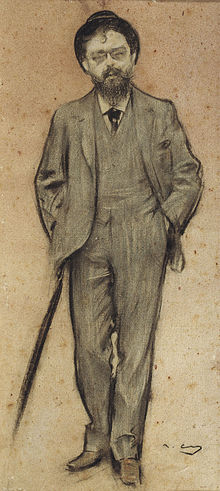- Profession: Composer, pianist.
- Residences: Madrid, Barcelona, Paris, Brussels, London.
- Relation to Mahler:
- Correspondence with Mahler: No.
- Born: 29-05-1860 Camprodon, Spain.
- Died: 18-05-1909 Cambo-les-Bains, departement Pyrenees-Atlantiques, France. Aged 48.
- Buried: 00-00-0000 Montjuic cemetery, Barcelona, Spain. Grave 20.
Isaac Manuel Francisco Albeniz y Pascual was a Spanish pianist and composer best known for his piano works based on folk music idioms. Many of his pieces such as Asturias (Leyenda), Granada, Sevilla, Cádiz, Córdoba, Cataluña, and the Tango in D are amongst the most important pieces for classical guitar. The personal papers of Isaac Albéniz are preserved, among other institutions, in the Biblioteca de Catalunya.
Composer. A leading figure in the Nationalist movement of Spanish music, his renown rests chiefly on his keyboard works, which combine traditional Spanish folk material with a modern pianistic idiom. “Iberia”, a collection of “impressions for piano” published in four books between 1905 and 1909, is considered his masterpiece.
Born in Camprodon, Catalonia, Spain, he was a child prodigy at the piano, making his performing debut at age four and embarking on his first international tour at 15. He attended the Conservatories in Leipzig, Germany and Brussels, Belgium, but was thwarted in his ambition to study with composer Franz Liszt. Initially turning out salon pieces in the manner of Frederic Chopin, Albeniz began writing in a nationalist style in the late 1880s after becoming friends with Felipe Pedrell, a teacher and folk scholar.
Thereafter he devoted himself to Spanish music, though he spent surprisingly little of his adult life in his homeland. He travelled widely as a concert pianist, lived in London, England from 1889 to 1893 and settled in France in 1894. Among his important compositions are the “Suite Espanola” (1886) for solo piano, the “Concierto fantastico” (1886) and “Spanish Rhapsody” (1887) for piano and orchestra, the operas “Pepita Jimenez” (1896) and “Merlin” (1902), and the tone poem “Catalonia” (1899). He died at 48 after a long battle with kidney disease; days before his death he had received France’s Legion of Honor.
Albeniz had a considerable influence on French as well as Spanish composers, notably Claude Debussy and Maurice Ravel. Today three movements from “Iberia” are popular in orchestral versions by Enrique Fernandez Arbos, and several of Albeniz’s piano pieces have been transcribed for guitar, most famously the “Asturias (Leyenda)” from the “Suite Espanola”.



